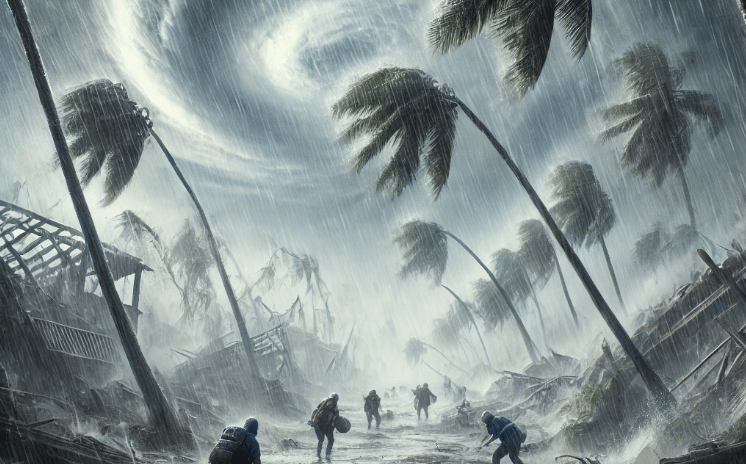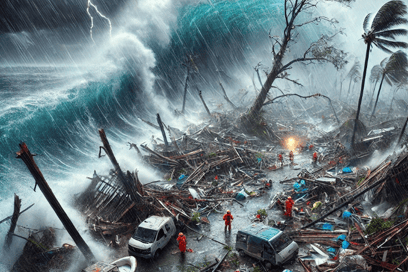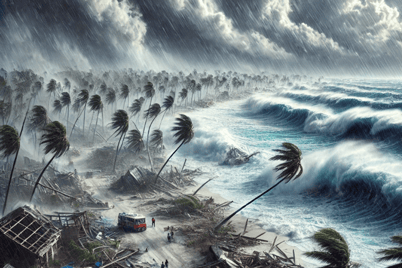Cyclone Chido Ravages Mayotte: Island Struggles with Deadliest Tragedy in History, Thousands Feared Dead
After bringing destruction across Mayotte — a French overseas territory — in one of the most catastrophic natural disasters to hit the Indian Ocean in decades, Cyclone Chido is no more. With early reports putting the death toll in the thousands, the island is confronting an unprecedented humanitarian disaster. The cyclone, which struck over the weekend, is the most powerful to hit the region in more than 90 years.
HOT NEWSTRENDY
Steve MCNAIR
12/16/20245 min read


After bringing destruction across Mayotte — a French overseas territory — in one of the most catastrophic natural disasters to hit the Indian Ocean in decades, Cyclone Chido is no more. With early reports putting the death toll in the thousands, the island is confronting an unprecedented humanitarian disaster. The cyclone, which struck over the weekend, is the most powerful to hit the region in more than 90 years.
The Storm’s Deadly Impact
Chido was packing winds of up to 140 mph (226 km/h), making it equivalent to a Category 4 hurricane. The storm also produced devastating storm surges, at heights of 13 to 28 feet. The sheer brutality of the cyclone has razed homes, schools, and infrastructure, leaving a trail of devastation in the destruction's wake. François-Xavier Bieuville, the prefect of Mayotte, described a bleak reality. “The official death toll is 14,” he said on Sunday, “but this is only the beginning. The final toll will undoubtedly be heavier — several hundred, perhaps one thousand, perhaps even several thousand.”
Destruction in Mayotte
Mayotte, which has more than 321,000 inhabitants, lies in the Indian Ocean near the southeastern coast of Africa. Many of its residents fight to get by, shantytowns couch the island. These flimsy buildings absorbed most of the fury of Cyclone Chido, crumpling under overwhelming winds and torrential rain. Survivors have recounted scenes of absolute chaos, with debris, possessions, and destroyed houses strewn across the island.
“Sometimes I wonder if the world is ending,” one survivor recalled of the terror of the storm. The wind ravaged everything. We could hardly escape with our lives.” Families have been made homeless, many living in improvised camps, or on the rubble of their homes.
Challenges for Rescuers
Rescue operations were in progress, with emergency workers arriving from mainland France and the nearby French-controlled territory of Réunion. But the scope of the devastation is hampering such efforts. Roads are obstructed by downed trees and debris, and communications networks have been disabled. The teams are pressed for time, searching for survivors who are buried beneath rubble or trapped in remote regions.
Cyclone Chido has been dubbed the worst storm to batter Mayotte in almost a century by French weather agencies. Its power and the island’s fragility have made a disaster that has solidified into a calamity of epoch-making proportions.
Cultural and Logistical Barriers
Cultural and religious practices that mandate burial of the deceased within 24 hours add to the challenges. Such customs make it harder to accurately account for deaths. The official death count may still be missing some names because many families have already buried their loved ones. Local leaders have pleaded with the international community to grasp the intricacy of the situation and respond quickly.
A Struggling Island
Mayotte is one of the poorest areas administered by France. Yet its French territory status has not protected it from systemic poverty and infrastructure shortages. The cyclone further laid bare the island’s vulnerabilities. Whole neighborhoods have been wiped out, and essential services, including electricity and water supply, remain interrupted.
Bieuville made a sober assessment: “The cyclone has not just claimed lives but destroyed livelihoods. Whole communities are laying in ruins. We need immediate aid.”
Immigration and Its Role
Mayotte has been a battleground in France’s immigration debates for decades. Thousands of asylum seekers from the nearby Comoros Islands have taken perilous voyages to get to Mayotte, hoping to gain French citizenship. This influx has strained island resources and amplified social and economic issues. Early in the year, French lawmakers were discussing whether to abolish automatic birthright citizenship for residents who are born on the island, a suggestion that provoked uproar.
Although immigration control and reform is one of the hottest issues, for now, the cyclone has overshadowed that, with a focus on survival and recovery. Even so, the disaster’s aftermath may provoke renewed discussions about the island’s preparedness and its frayed resources.
Global and Domestic Response
France has promised extensive support for Mayotte. Rescue teams, military personnel, and humanitarian aid are being mobilized to help the island. The European Union is also ready to offer financial and logistical help.
Community members locally have come together to support one another. Volunteers are also giving out food, water, and medical supplies. Schools and public buildings are being readied as makeshift shelters. But these were not enough to cope with the overwhelming needs.
A Call for Help
The destruction in Mayotte has prompted calls for an international response. Humanitarian groups are calling on the world to provide donors with the aid and funds needed to assist the recovery. The cyclone has highlighted the critical need for climate resilience in vulnerable areas like Mayotte.
Climate change is making extreme weather events more common and voracious, experts have warned. Seas around islands in the Indian Ocean like Mayotte, where storms have become more intense and sea levels have risen in the past, come with increased risks. It is time for governments and organizations to arm themselves with the necessary tools to prevent future disasters.
Heartbreaking Losses
In the chaos, there have been stories of loss and survival. A primary school was reduced to rubble in the capital, Mamoudzou. "It was more than a school," a teacher who made it out of the collapse said. "With everything that means, it was a safe space for children. Now it's gone." Families have been ripped apart, and many are looking for missing relatives. They walk down the street, their faces stricken with fear and disbelief.
The psychological cost of the disaster is enormous. Survivors are struggling with the trauma of losing homes, possessions, and in some cases, loved ones. Mental wellness support will be key in the months to come as the island emerges from recovery.
Looking Ahead
As the darkest hour of Mayotte dawns, and with it a struggle for dignity, the hope of its people prevails. Communities are uniting to start the rebuilding process, even as they grieve their dead. The quest for recovery will be long and hard and, with the right assistance, the island can prevail from the carnage.
The Cyclone Chido tragedy serves a harsh warning that the world must come together as family on similar events. With Mayotte now in the world's eyes, there is a hope that its response will be both swift and impactful, but also compassionate.
Mayotte's story is one of heartbreak, resilience, and an urgent plea for assistance. However, Cyclone Chido had a lasting impact on the island, and its people are now looking to mend whatever possible.
Written by Steve MCNAIR




Updates
Stay informed with the latest trending news.
Insights
News
contact@flashtopnews.com
+1234567890
© 2024. All rights reserved.
Disclaimer: We are affiliates. It means that we may receive a commission if you ever purchase a product on our site, with no-extra cost for you of course... Thank You Very Much!
